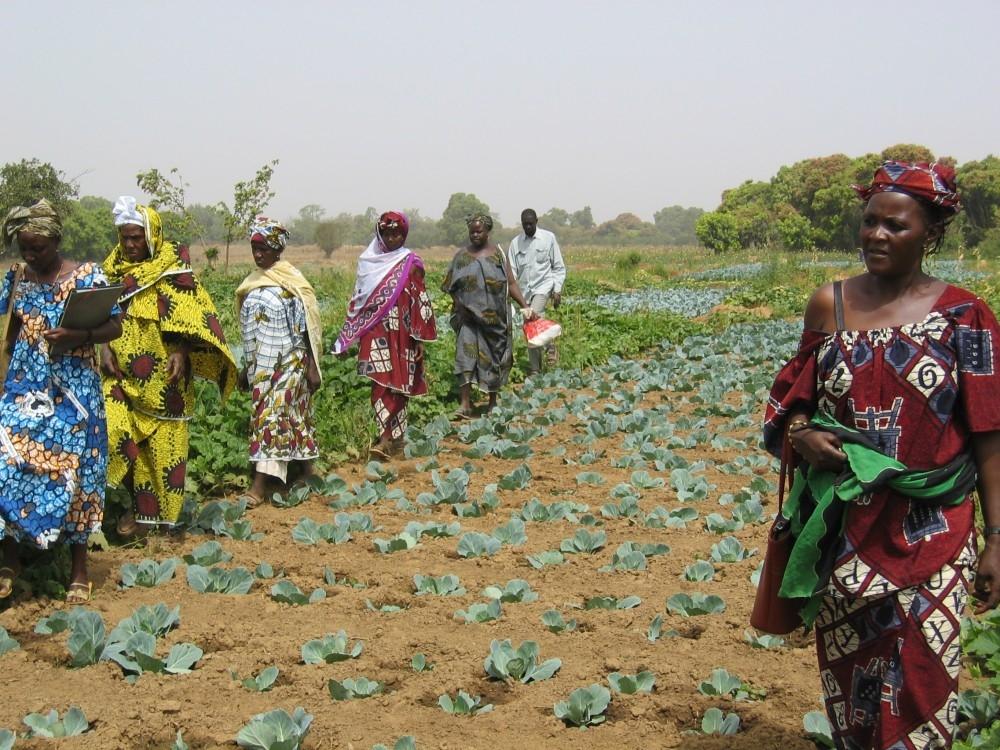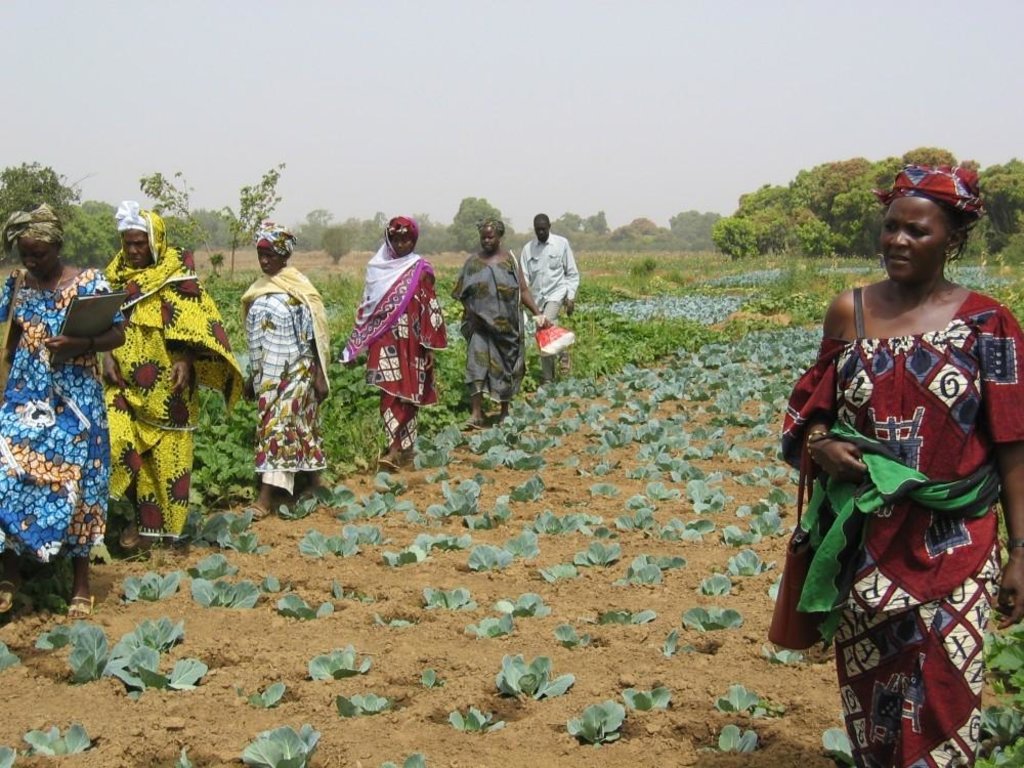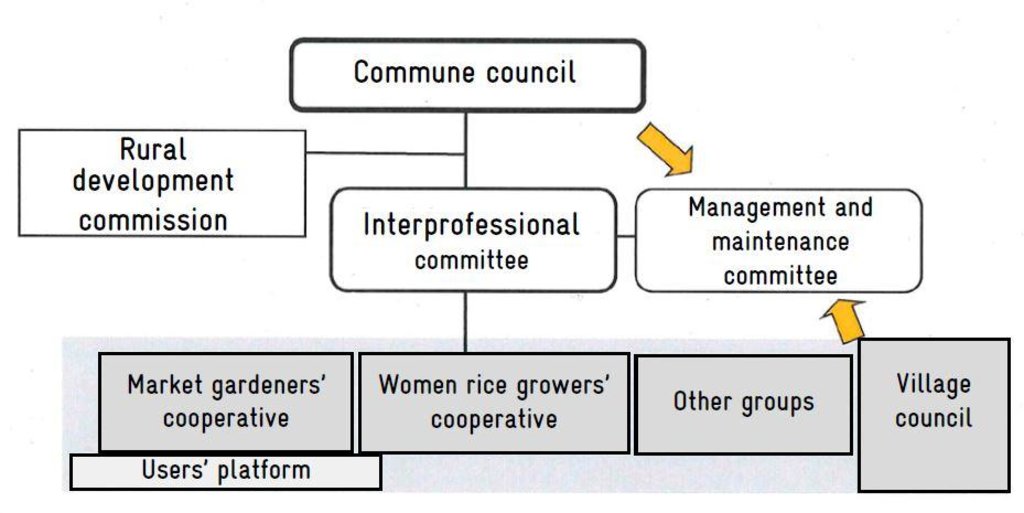Delegating the management of facilities to users [Mali]
- Creación:
- Actualización:
- Compilador: Dieter Nill
- Editor: –
- Revisor: Laura Ebneter
Délégation de gestion des équipements aux exploitants (French)
approaches_2503 - Mali
Visualizar secciones
Expandir todo Colapsar todos1. Información general
1.2 Detalles de contacto de las personas de referencia e instituciones involucradas en la evaluación y la documentación del Enfoque
Especialista MST:
Tamini Jacques
jacques.tamini@helvetas.org
HELVETAS - Swiss Intercooperation
Mali
Especialista MST:
Doumbia Moussa
douballa03@yahoo.fr / bulonbasecom@yahoo.fr
Intercommunalité de Bougouni "Bulonba"
Mali
Nombre de la(s) institución(es) que facilitaron la documentación/ evaluación del Enfoque si fuera relevante)
Deutsche Gesellschaft für Internationale Zusammenarbeit (GIZ) GmbH (GIZ) - AlemaniaNombre de la(s) institución(es) que facilitaron la documentación/ evaluación del Enfoque si fuera relevante)
HELVETAS (Swiss Intercooperation)1.3 Condiciones referidas al uso de datos documentados mediante WOCAT
¿Cuándo se compilaron los datos (en el campo)?
01/07/2012
El compilador y la/s persona(s) de referencia claves aceptan las condiciones acerca del uso de los datos documentados mediante WOCAT :
Sí
2. Descripción del Enfoque MST
2.1 Breve descripción del Enfoque
Promote the sustainability and cost effectiveness of schemes by setting up management delegation systems that enable local authorities to entrust infrastructure owned by the territorial community to groups of local farmers.
2.2 Descripción detallada del Enfoque MST
Descripción detallada del Enfoque MST:
The basic economic infrastructure is usually provided through state or decentralised-authority funding. The building phase of the project is entirely managed by the territorial community (TC). A delegation process ensures that responsibility for managing this infrastructure is transferred to beneficiary actors organised in user associations. Agreements are concluded between the TCs and communities with the aim of guaranteeing the sustainability and economic viability of facilities. This agreement makes it possible to extend the ownership of schemes beyond that of the traditional management committee model. It can also increase local tax revenues and prolong the lifespan of facilities when they are well run.
The commune is the owner of the scheme but delegates its management to a user group (an interprofessional farming committee for lowland development projects) by means of a management delegation contract. Member subscription fees and upkeep fees are paid into a bank account opened by the community. The commune has the right to oversee the administrative and financial management of the delegatee and ensures the application of access and farming rules in the scheme. Group managers regularly report on activities to other members and the commune.
The commune council undertakes the overall project management of the installation works, contributes to funding the developments, provides key guidance on farming matters, delegates the management of the infrastructure to the interprofessional committee (IPC), supports the IPC in recovering fees, and ensures the monitoring and development of the project. The rural development commission of the commune council exists within each council. Its role is to catalogue the issues actors face and propose solutions to the commune council, support cooperatives in their search for partners together with the IPC, research the land titles for schemes on behalf of the council (registration), validate the development plan, support IPC in managing conflicts between cooperatives, and carry out any other tasks that are required of it by the commune council. The interprofessional committee brings together representatives from different cooperatives, associations and groups and takes on the delegated management role. Its role is to: maintain communications between users, the town hall and partners; coordinate activities that affect several local-level cooperatives; ensure the rational use of lowland resources; secure the agreement of the different user groups on the rules for accessing and dividing up the scheme site; assess and validate the cooperatives’ farming plans (individual needs analysis in terms of production capacity); monitor the use of inputs, seed and equipment obtained by the cooperatives; receive the fees collected by each cooperative from its members; manage renovation and maintenance funds; prevent conflicts of interest arising among the cooperatives. The management committee is a sub-committee within IPC and is tasked with managing water supply (opening and closing the distribution gates), carrying out small-scale maintenance and alerting the IPC to any failures to respect the farming code. Consultancies facilitate the process, support the institutional and organisational strengthening of actors and provide training on management tools. Technical services ensure the application of technical and environmental standards and ensure sound financial management (fee collection, financial controls, delegated public procurement). The project team provides advisory support, organises users structurally and delivers training, tools, coordination and monitoring.
2.3 Fotos del Enfoque
2.5 País/ región/ lugares donde el Enfoque fue aplicado
País:
Mali
Región/ Estado/ Provincia:
Mali
Especifique más el lugar :
Sikasso region, circles of Bougouni, Kolondiéba and Yanfolila
2.6 Fechas de inicio y conclusión del Enfoque
Indique año del inicio:
2008
2.8 Propósitos/ objetivos principales del Enfoque
The Approach focused mainly on SLM with other activities
The objective of the practice is to promote the sustainability and cost effectiveness of schemes by setting up management delegation systems that enable local authorities to entrust infrastructure owned by the territorial community to groups of local farmers.
The SLM Approach addressed the following problems: lack of infrastructure for local farmers, low sustainability and cost-effectiveness of schemes
2.9 Condiciones que facilitan o impiden la implementación de la/s Tecnología/s aplicadas bajo el Enfoque
conocimiento de MST, acceso a apoyo técnico
- impiden
The basic economic infrastructure is usually provided through state or decentralised-authority funding.
Treatment through the SLM Approach: A delegation process ensures that responsibility for managing this infrastructure is transferred to beneficiary actors organised in user associations with the aim of guaranteeing the sustainability and economic viability of facilities.
3. Participación y roles de las partes interesadas involucradas
3.1 Partes interesadas involucradas en el Enfoque y sus roles
- usuarios locales de tierras/ comunidades locales
- especialistas MST/consejeros agrícolas
- gobierno local
- gobierno nacional (planificadores, autoridades)
3.2 Involucramiento de los usuarios locales de tierras/ comunidades locales en las distintas fases del Enfoque
| Involucramiento de los usuarios locales de tierras/ comunidades locales | Especifique quién se involucró y describa las actividades | |
|---|---|---|
| iniciación/ motivación | interactivo | |
| planificación | interactivo | |
| implementación | interactivo | |
| monitoreo y evaluación | interactivo | |
| Research | pasivo |
3.3 Flujograma (si estuviera disponible)
Descripción:
The measure relies on the direct actors shown in the diagram, who are supported by other stakeholders. From the start of installation works, the commune supports the project in setting up a management system. Installation works are co-funded by the technical and financial partners (TFP), communes and beneficiary villages. It must nevertheless be highlighted that the infrastructure remains the property of the commune and beneficiaries must pay a fee for its upkeep. The commune selects the consultancy (project manager) and chooses the contractor. The commune also Monitors scheme installation and accepts works. A second consultancy is tasked with giving producers guidance on farming and management techniques. The different user groups (market gardeners/planters, women rice growers, livestock farmers, etc.) are formed into interprofessional committees or farming committees. The commune draws up the draft delegated management contract with the interprofessional committee or the cooperative. To this end, it evaluates the potential of the resources that can be mobilised and discusses with its partners the rules for farming the scheme and the methods for its maintenance and repair. Following this, the contract is signed.
3.4 La toma de decisiones en la selección de Tecnología(s) MST
Especifique quién decidió la selección de las Tecnología/ Tecnologías a implementarse:
- principalmente usuarios de tierras con el apoyo de especialistas MST
Explique:
Decisions on the method of implementing the SLM Technology were made by mainly by land users supported by SLM specialists
4. Apoyo técnico, fortalecimiento institucional y gestión del conocimiento
4.2 Servicio de asesoría
¿Los usuarios de tierras tienen acceso a un servicio de asesoría?
Sí
Especifique si servicio proporcionado se realizó:
- en centros permanentes
Describa/ comentarios:
Advisory service is quite adequate to ensure the continuation of land conservation activities; Setting up this system requires ongoing support for two to five years to allow beneficiaries to take ownership of the scheme.
4.3 Fortalecimiento institucional (desarrollo institucional)
¿Se establecieron o fortalecieron instituciones mediante el Enfoque?
- sí, moderadamente
Especifique el nivel o los niveles en los que se fortalecieron o establecieron las instituciones:
- local
Especifique el tipo de apoyo:
- financiero
4.4 Monitoreo y evaluación
¿El monitoreo y la evaluación forman parte del Enfoque?
Sí
Comentarios:
technical aspects were ad hoc monitored by project staff, land users through observations
socio-cultural aspects were ad hoc monitored by project staff, land users through observations
economic / production aspects were ad hoc monitored by project staff, land users through measurements
There were no changes in the Approach as a result of monitoring and evaluation
There were no changes in the Technology as a result of monitoring and evaluation
4.5 Investigación
¿La investigación formó parte del Enfoque?
Sí
Especifique los temas:
- sociología
- economía/ marketing
- ecología
- tecnología
5. Financiamiento y apoyo material externo
5.1 Presupuesto anual para el componente MST del Enfoque
Comentarios (ej. fuentes principales de financiamiento/ donantes principales):
Approach costs were met by the following donors: private sector (technical and financial partners (TFP)): 85.0%; local government (district, county, municipality, village etc) (commune): 10.0%; local community / land user(s) ( village): 5.0%
5.2 Apoyo financiero/material proporcionado a los usuarios de tierras
¿Los usuarios de tierras recibieron financiamiento/ apoyo material para implementar la Tecnología/ Tecnologías? :
Sí
Si respondió sí, especifique el tipo o los tipos de apoyo, condiciones y proveedor(es) :
Installation works are co-funded by the technical and financial partners (TFP), communes and beneficiary villages. In small-scale irrigation projects, for example, the project provides up to 85% of the funds; the village 5% and the commune 10%. The beneficiaries contribute either in-kind or financially.
5.3 Subsidios para insumos específicos (incluyendo mano de obra)
Si la mano de obra de usuarios de tierras fue un insumo sustancial, ¿fue:
- voluntario?
6. Análisis de impacto y comentarios de conclusión
6.1 Impactos del Enfoque
¿El Enfoque ayudó a los usuarios de tierras a implementar y mantener Tecnologías MST?
- No
- Sí, un poco
- Sí, moderadamente
- Sí, mucho
Consensually agreed farming codes and rules are instituted and monitored. Agreements are concluded between the TCs and communities with the aim of guaranteeing the sustainability and economic viability of facilities.
¿El Enfoque empoderó a grupos en desventaja social y económica?
- No
- Sí, un poco
- Sí, moderadamente
- Sí, mucho
Did other land users / projects adopt the Approach?
- No
- Sí, un poco
- Sí, moderadamente
- Sí, mucho
The system was first initiated and developed at 34 commercial infrastructure trade fairs. Today, it involves 15 farming sites. The practice has been applied since 2008.
Did the Approach lead to improved livelihoods / human well-being?
- No
- Sí, un poco
- Sí, moderadamente
- Sí, mucho
In the Bougouni area, 552 hectares are being farmed by 1,671 rice growers, 80% of whom are women. Production has increased for 70% of growers. The principle of a maintenance fund has been accepted and is now operational, with deposits ranging from 75,000 to 300,000 CFA francs per year
Did the Approach help to alleviate poverty?
- No
- Sí, un poco
- Sí, moderadamente
- Sí, mucho
6.2 Motivación principal del usuario de la tierra para implementar MST
- producción incrementada
- incremento de la renta(bilidad), proporción mejorada de costo-beneficio
6.3 Sostenibilidad de las actividades del Enfoque
¿Pueden los usuarios de tierras sostener lo que se implementó mediante el Enfoque (sin apoyo externo)?
- incierto
Si respondió no o incierto, especifique y comente:
Setting up this system requires ongoing support for two to five years to allow beneficiaries to take ownership of the scheme.
6.4 Fortalezas/ ventajas del Enfoque
| Fuerzas/ ventajas/ oportunidades desde la perspectiva del compilador o de otra persona de referencia clave |
|---|
| Many repairs are already being handled by the delegated management structures. These structures ensure that the consensually agreed rules are appropriately applied. A new kind of partnership has been created between the local authorities and village communities. |
|
It can increase local tax revenues and prolong the lifespan of facilities when they are well run. How to sustain/ enhance this strength: The commune authorities must be willing to promote transparency in communications on works procurement and accept requests for clarification (public audits). The community must have leaders in place who are prepared to lead frank public discussions among key players that are also courteous and respectful. This also applies to the management committee. Monitoring and evaluation of the delegation contract is essential between the commune and platform. It is important to undertake an annual review, the conclusions of which will also be shared with the wider community. To do this, the management committee must be in a position to draw up a balance sheet. The village must be prepared to contribute (with their labour or funds) towards installing the scheme, prior to registering it in the PDESC. It is essential to remove any ambiguity from bylaws for the scheme belonging to the commune. If it is true that actors rarely challenge the old, established rules for accessing rice growing sites, the same cannot be said for market gardens, where the plot allocation rules fall easily into place. Growers must pay the amounts/fees agreed with the commune.) |
| Subscription fees are collected more easily: 84% of members pay their subscription fees for the area in question. Consensually agreed farming codes and rules are instituted and monitored. In the Bougouni area, 552 hectares are being farmed by 1,671 rice growers, 80% of whom are women. Production has increased for 70% of growers. The principle of a maintenance fund has been accepted and is now operational, with deposits ranging from 75,000 to 300,000 CFA francs per year. |
7. Referencias y vínculos
7.1 Métodos/ fuentes de información
- visitas de campo, encuestas de campo
- entrevistas con usuarios de tierras
7.2 Referencias a publicaciones disponibles
Título, autor, año, ISBN:
Manual of Good Practices in Small Scale Irrigation in the Sahel. Experiences from Mali. Published by GIZ in 2014.
¿Dónde se halla disponible? ¿Costo?
http://star-www.giz.de/starweb/giz/pub/servlet.starweb
Título, autor, año, ISBN:
Rapport appui à la valorisation des ouvrages hydroagricoles [Report on supporting the development of small-scale irrigation schemes], GSAD, June 2012
Título, autor, año, ISBN:
Annual report: Monitoring lowland areas, BEACIL, June 2012
Vínculos y módulos
Expandir todo Colapsar todosVínculos
No hay vínculos
Módulos
No se hallaron módulos




